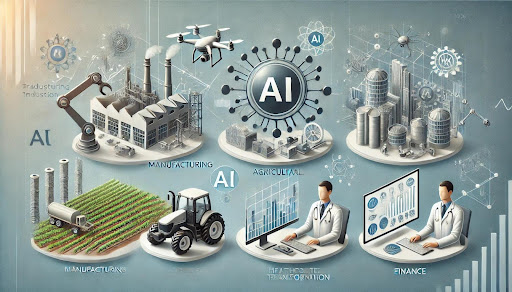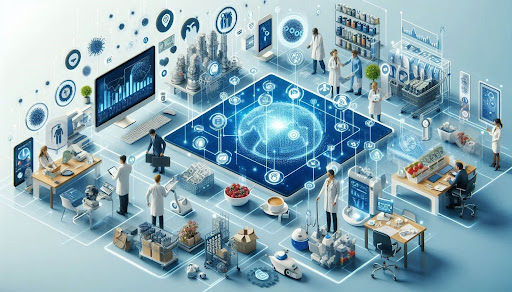AI Is Revolutionizing Traditional Industries—Are You Ready to Adapt?
Discover how AI is transforming manufacturing, agriculture, healthcare, and finance, and learn how your business can stay ahead in this AI-driven future.
Introduction
Artificial Intelligence (AI) is not merely an innovation confined to tech-driven sectors. It has become a transformative force across traditional industries such as manufacturing, agriculture, healthcare, and finance. With capabilities to enhance efficiency, cut costs, and enable unprecedented innovation, AI has shifted from being an optional advantage to a business necessity in a competitive and evolving global landscape.
This comprehensive guide examines how AI is revolutionizing traditional industries, delves into its key applications, addresses ethical and regulatory concerns, and explores emerging trends that are defining its future impact.
What Is AI, and How Is It Reshaping Industries?
AI refers to technologies like machine learning (ML), deep learning, and natural language processing (NLP) that enable machines to emulate human intelligence. It powers automation, data analysis, and improved decision-making processes, offering endless opportunities for businesses to redefine their operations.
Core Capabilities of AI
- Machine Learning (ML): AI systems analyze historical data, identify trends, and make predictions to streamline processes and optimize outcomes.
- Natural Language Processing (NLP): NLP enables systems to interpret, process, and respond to human language, playing a pivotal role in customer service and analytics.
- Computer Vision: AI’s ability to interpret and analyze visual inputs is revolutionizing quality control, autonomous vehicles, and medical imaging.
How AI Is Transforming Traditional Industries
Traditional industries often face entrenched challenges such as inefficiencies, lack of skilled labor, and regulatory compliance. AI addresses these challenges through:
- Operational Automation: Replacing manual tasks with AI-driven workflows to save time and resources.
- Predictive Analytics: Turning historical data into actionable insights for proactive decision-making.
- Customer-Centric Experiences: Enabling hyper-personalized services that improve satisfaction and loyalty.

AI in Traditional Industries: Key Applications
1. Manufacturing
Manufacturing is one of the sectors most profoundly impacted by AI, which enhances productivity and reduces operational costs.
- Smart Factories: AI monitors production lines in real time, detecting inefficiencies and preventing downtime.
- Predictive Maintenance: Algorithms forecast machine failures, enabling preemptive repairs and reducing costly outages.
- Quality Assurance: Computer vision systems inspect products with exceptional precision, ensuring adherence to quality standards.
2. Agriculture
AI-driven technologies are helping the agriculture sector transition from labor-intensive practices to data-driven precision farming.
- Precision Agriculture: AI systems analyze soil health, crop conditions, and weather data to optimize yields.
- Drone Technology: AI-powered drones monitor vast fields, identify pest infestations, and provide actionable insights for targeted interventions.
- Supply Chain Optimization: Predictive analytics ensure efficient storage and timely delivery of agricultural products, reducing waste and maximizing profits.
3. Healthcare
The healthcare sector is undergoing a revolution, with AI improving diagnostics, treatment planning, and operational efficiency.
- Advanced Diagnostics: AI algorithms analyze radiology images and genetic data, enabling early detection of diseases such as cancer.
- Telemedicine: NLP-driven chatbots and virtual assistants provide round-the-clock remote consultations.
- Drug Discovery: AI accelerates drug development by identifying potential compounds and predicting their effectiveness.
4. Finance
The financial industry is leveraging AI for improved risk management, fraud detection, and customer engagement.
- Fraud Prevention: AI analyzes transaction data in real time to flag unusual patterns indicative of fraudulent activities.
- Risk Assessment: Machine learning models assess creditworthiness and predict market volatility, allowing for informed financial planning.
- Automated Customer Service: AI chatbots resolve customer queries efficiently, improving satisfaction and reducing operational costs.
Case Studies: Success Stories in AI Adoption
1. Siemens
Siemens, a global manufacturing leader, employs AI-powered predictive maintenance to monitor machinery. This approach has reduced unplanned downtime by 20% and saved millions in operational costs.
2. John Deere
John Deere integrates AI into its agricultural equipment, providing farmers with real-time insights into soil quality and crop health. This has improved both productivity and sustainability, cementing the company’s leadership in precision farming.
3. Mayo Clinic
Mayo Clinic utilizes AI to analyze radiology images, achieving faster and more accurate disease detection. Their AI systems have reduced diagnostic errors by 25%, significantly improving patient outcomes.
Ethical Considerations and Challenges
While the potential of AI is enormous, its adoption raises critical ethical and operational challenges that industries must address:
1. Job Displacement
Automation of repetitive tasks may lead to job losses, particularly in manufacturing and agriculture. The solution lies in creating reskilling programs to prepare the workforce for new roles in an AI-driven ecosystem.
2. Data Privacy
AI systems rely on vast amounts of data, raising concerns about data security, misuse, and regulatory compliance. Strict adherence to frameworks like GDPR and CCPA is vital to maintaining consumer trust.
3. Transparency in AI Decisions
AI’s decision-making can sometimes appear opaque, particularly in high-stakes areas like healthcare and finance. Companies must prioritize explainable AI (XAI) models to ensure accountability and transparency.
Strategies to Mitigate Ethical Challenges
- Establish clear guidelines for AI deployment and usage.
- Foster collaboration between industry leaders, governments, and ethical bodies to develop robust standards.
- Increase public awareness of AI’s benefits and limitations to build trust and acceptance.

Future Trends: What’s Next for AI in Traditional Industries?
The evolution of AI continues to open new avenues for innovation across traditional sectors. Key trends shaping the future include:
1. Generative AI
Generative AI technologies, such as OpenAI’s GPT, are revolutionizing creativity by generating prototypes, marketing content, and even architectural designs.
2. AI-Driven Sustainability
AI is a critical enabler of sustainable practices, helping industries optimize resource use, reduce waste, and transition to renewable energy solutions.
3. Hyperautomation
The convergence of AI, robotics, and IoT will create fully automated ecosystems capable of managing entire workflows autonomously, significantly boosting efficiency.
4. Collaborative AI Systems
AI will increasingly function as a complement to human workers rather than a replacement. This hybrid approach will allow professionals to focus on strategic decision-making and creative problem-solving.
Navigating Regulatory Landscapes
As AI adoption accelerates, the regulatory environment is evolving to ensure ethical and responsible implementation:
- Data Protection Laws: Regulations like GDPR (EU) and CCPA (US) provide frameworks for secure data usage.
- Industry-Specific Compliance: Sectors such as healthcare and finance are developing tailored AI governance protocols.
- Global Cooperation: International collaboration is fostering standardization in AI ethics, addressing cross-border concerns, and promoting equitable access to AI technologies.
Conclusion
Artificial Intelligence is no longer a niche technology—it is a transformative force reshaping the foundations of traditional industries. By adopting AI, businesses can achieve unparalleled efficiency, foster innovation, and navigate the complexities of a rapidly evolving world. However, successful integration requires a balanced approach that addresses ethical, operational, and regulatory challenges.
Ready to explore how AI can transform your industry? Take our free AI assessment at assessment.com and discover tailored solutions designed for your unique needs.
